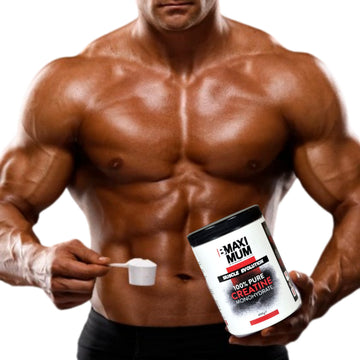
Introduction:
What is Creatine?
Creatine is a naturally occurring compound found in certain foods like meat, seafood, and milk. It is also produced by the body in the liver and kidneys. Approximately half of the body's creatine supply comes from the diet, while the rest is synthesized internally. Creatine is stored in the muscles and plays a crucial role in providing energy for muscle contraction during physical activity.
Creatine as a Performance Enhancer:
Athletes, including both amateur and professional, have turned to creatine supplements to improve their exercise routines and enhance workout recovery. Creatine is known to increase "quick burst" energy and enhance strength, making it particularly beneficial for activities that involve short, intense bursts of effort. Power sports such as football, wrestling, hockey, bodybuilding, and high-intensity interval training can benefit from creatine supplementation.
Creatine vs. Steroids:
It is important to clarify that creatine is not a steroid. Steroids are synthetic substances that mimic the effects of testosterone, a hormone responsible for muscle growth. Creatine, on the other hand, is a naturally occurring compound that aids in energy production and muscle contraction. The International Society of Sports Nutrition recognizes creatine as one of the most effective sports nutrition supplements available. It is widely regarded as safe for use by both men and women, as well as teenagers.
How Creatine Works:
Creatine functions by increasing the levels of creatine phosphate in the muscles. This, in turn, aids in the production of adenosine triphosphate (ATP), a high-energy molecule that fuels muscle contractions during exercise. By providing additional phosphate molecules to adenosine diphosphate (ADP), creatine supplementation helps regenerate ATP more rapidly, allowing for increased energy availability and extended workout performance.
Benefits of Creatine Supplementation:
- Increased muscle strength and power: Creatine enables individuals to work harder and for longer periods, leading to greater gains in muscle strength.
- Anabolic hormone support: Creatine can raise anabolic hormones like IGF-1, which play a vital role in muscle building when combined with resistance training.
- Improved cell signaling: Creatine enhances cell communication, facilitating better muscle growth and recovery.
- Cell hydration: Creatine draws water into the muscles, creating more space for muscle growth and increasing cell volume.
- Reduction in protein breakdown: Creatine supplementation reduces protein breakdown, aiding in muscle building and maintenance.
Safety and Side Effects:
Creatine supplementation is generally considered safe for most individuals when taken within the recommended dosage range of three to five grams per day. However, some individuals may experience mild side effects such as weight gain due to water retention or digestive issues. It is crucial to consult a healthcare provider before taking creatine, especially if you have a history of liver or kidney issues or if you are taking medication to control blood glucose levels. Following the recommended dosage guidelines and staying adequately hydrated can help minimize potential side effects.
Conclusion:
Creatine is a valuable supplement for athletes and fitness enthusiasts looking to enhance their performance, increase muscle strength, and improve workout recovery. It is not a steroid but a naturally occurring compound that aids in energy production and muscle contraction. With its extensive research and recognition by reputable sports nutrition organizations, creatine has proven to be a safe and effective dietary supplement. As with any supplement, it is essential to consult a healthcare provider before use, especially if you have pre-existing medical conditions.







